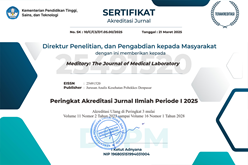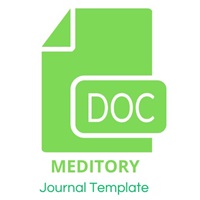THE EFFECT OF STORAGE TIME AND TYPE OF ANTIKOAGULANT IN PLATELET RICH PLASMA (PRP) ON PLATELET COUNTS
DOI:
https://doi.org/10.33992/meditory.v12i2.3397Abstract
Background: Platelet Rich Plasma is a biological product in the form of autologous plasma produced from the centrifugation process of blood specimens and has a platelet concentration above normal values. Things that can affect the results of PRP are blood collection, centrifugation speed, centrifugation time and temperature and the use of anticoagulants. Aims: The purpose of this study was to determine the average and see the effect of sodium citrate anticoagulant and ACD-A anticoagulant by using a shelf life of 0 hours, 4 hours and 8 hours in PRP on platelet count. Methods: This type of research is a pseudo-experiment with a Statistica Group Comparison research design. The number of samples in this study were 6 people. PRP research data on platelet count was processed statistically with the General Linear Model (GLM) method. The Results: The average data of PRP on platelet count using sodium citrate anticoagulant with a shelf life of 0 hours 533.333 cell/µL; 4 hours 527.167 cell/µL; 8 hours 190.167 cell/µL. Average data of PRP on platelet count using ACD-A anticoagulant with a shelf life of 0 hours 986.333 cell/µL; 4 hours 976.500 cell/µL; 8 hours 634.833 cell/µL. The data results for 0 hour and 4 hour shelf life on anticoagulants Sodium Citrate and ACD-A have a Sig value of 0.646 > 0.05 while 8 hour shelf life has a Sig value of 0.000 < 0.05. Conclusion: No effect of 0 hour and 4 hour shelf life while there is an effect of 8 hour shelf life and there is an effect of anticoagulants Sodium Citrate and ACD-A in PRP on platelet count.
Downloads
Published
Issue
Section
Citation Check
License
- Articles published in Meditory are licensed under a Creative Commons Attribution-ShareAlike 4.0 International license. You are free to copy, transform, or redistribute articles for any lawful purpose in any medium, provided you give appropriate credit to the original author(s) and Meditory, link to the license, indicate if changes were made, and redistribute any derivative work under the same license.
- Copyright on articles is retained by the respective author(s), without restrictions. A non-exclusive license is granted to Meditory to publish the article and identify itself as its original publisher, along with the commercial right to include the article in a hardcopy issue for sale to libraries and individuals.
- By publishing in Meditory, authors grant any third party the right to use their article to the extent provided by the Creative Commons Attribution-ShareAlike 4.0 International license.




